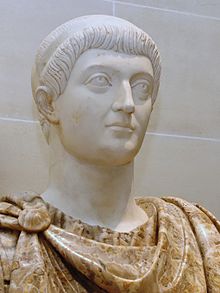Below, abridged translation from the first
volume of Karlheinz Deschner’s Kriminalgeschichte
des Christentums (Criminal History of Christianity)
First wars among devout Christians
After the massacre, the sons of Constantine shared the spoils. The eldest, Constantine II (337-340) stayed with the western provinces, Gaul, Hispania, Britannia, and established his residence in Trier; the youngest, Constans, the centrals, Italy, Africa and Greece, with its capital in Sirmium (the current Mitrovicz, in Serbia). Constantius II (337-361), who survived and inherited them all, was awarded East and resided in Antioch until 350, when he was not campaigning.
 (Bust of Constans)
(Bust of Constans)
Soon war broke out between the eldest and the youngest on a question of border demarcation. In early 340, Constantine II left Gaul and invaded Italy by surprise, but fell into an ambush near Aquileia, while trying to force an alpine pass. Constans’ generals killed him and threw the corpse into the river. In those moments Constantius II, as we will see in the following section, was very busy with the quarrels between Christians and especially with the incursions of the Persians in the East, so that Constans could stay with the western provinces without any discussion.
That seventeen-year-old adolescent, owner of two thirds of the immense empire, was the only one baptized among the sons of Constantine and had been educated in chastity, the ultimate Christian virtue, as we know. In fact, he shied away from women but used to enjoy the company of blond Germans, hostages or slaves, with whom he went out to hunt in remote solitary forests, while publicly declaring himself an enemy of pederasty.
Within the domains of Constans the first temple destructions, sporadic at the beginning, are produced in Rome, as well as a renewed persecution against the Donatists. As they did not allow themselves to be corrupted by the monies of the emperor, which the old Donatus had brusquely rejected, Constans decided to expropriate the unbowed clerics and, by force of arms, handed over the Donatist churches to the Catholics.
In 347 there was the bloody crushing of the Bagai insurrection, where the ordinary was assassinated, another Donatus and Bishop Majorinus, principal saint of the Donatists. Others were tied to columns and whipped by order of Macarius, the imperial commissioner, praised by Catholics as ‘advocate of the holy cause’. They began to speak of ‘the Macarian persecution’. Some Donatists died tortured in prisons. Many fled and others were exiled. Donatus himself died, apparently in the wreck of the ship where he was travelling deported. The assets of the exiles were confiscated.
Meanwhile, on January 18, 350, there was in Autun (Lyon) the pronouncement of General Magnentius, born in Amiens and the son of a Frankish and a Breton, who seized the western provinces. According to some later sources he was pagan; however, the coins he minted suggest the opposite, that is, he was a Christian. The Franks and the Saxons supported him at once, and all the towns and fortresses of the Rhine fell into his hands. Britain, Gaul, Italy, and Africa hastened to recognize him as emperor.
Certainly, Magnentius, the first Germanic anti-caesar and the most dangerous of all the usurpers who threatened the throne of Constantius (up to six in all), failed to enjoy his victory for a long time. The emperor left the Balkans for the Danube, to initiate the ‘holy war’, with troops that doubled those of his opponent. According to Theodoret, even the pagans of the army had to be baptized by order of Constantius.
Magnentius was expelled from Italy in 352; was also defeated in Gaul, and on August of 353, seeing himself surrounded in his castle of Lyon, he threw himself on the tip of his own sword, not without having finished with his intimate friends before; his brother Desiderius and his mother. Constantius had the enemy’s head roved around the country, and had many others cut off.